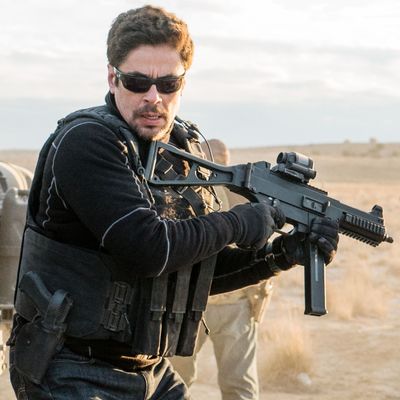
Francois Truffaut’s assertion that there is “no such thing as an anti-war film” has been getting a lot of traction in recent years, and if you’re inclined to agree with it, then I think it’s safe to extend the statement to America’s protracted, relentlessly immortalized war on drugs. I certainly had it in the back of my mind while watching the first Sicario, though Denis Villeneuve’s oppressively bleak and plodding (in a good way, I’d say) handle on that film’s action sequences do as much to deglamorize the business of DEA raids and cartel violence as I suppose one can. There is no up in these films, which is the main thing Stefano Sollima’s sequel has in common with its predecessor; as the action fades, the players once again look around at each other, wondering what any of it was for.
This is particularly emphasized in Soldado, which opens with the uncomfortably timely image of Mexican migrants crossing the Texas border and being surrounded by border patrol officers. (There are allusions to a POTUS with varying opinions on the goings-on south of the border, which convinces me more than ever that post-2016, you cannot refer to the American president without first assuring us which one you are referring to.) One of the migrants breaks off from the group, mutters an “Allahu Akbar” and blows himself up. Afterwards, we see a horrifying scene of a hardware store in Kansas City being attacked by suicide bombers, and the secretary of State (Matthew Modine) gives a televised statement punctuated with some boilerplate fighting words: “Your bombs do not terrify us, they empower us.” Perhaps I come to these things with my own preoccupations, but I couldn’t help but hear it as more of a statement about the American appetite for film violence than homeland security.
So the lines are drawn; the already feared and hated Mexican cartel border traffickers are now a funnel for Middle Eastern terrorists as well, the nightmare of every xenophobe and hawk rolled into one conveniently missile-able target. Josh Brolin’s Matt Graver is summoned for a black-ops mission to set off a cartel war, and he quickly reunites with Alejandro (Benicio Del Toro.) Their plan is to stage the kidnapping of a drug lord’s teenage daughter (Isabela Moner) make it look like the work of a rival, and let the bullets fly. That it’s these two jet-black cynics we’re following, and that Emily Blunt’s outsider FBI agent is nowhere to be found, tells you a little bit about what this movie’s objective is: to fully wallow in its morass, unencumbered by character transformation. Or, as one character asks another incredulously as the scheme inevitably goes south, “You believe change is the goal?” Again, it seems to me that writer and Hollywood’s Great Masculine Hope Taylor Sheridan, consciously or not, understands the wheel-circling nature of the kind of the-world-is-garbage pseudo-deep brutality fests he traffics in.
And yet, there is something compelling about Soldado’s violence, though it contains nothing so memory searing as its predecessor’s most tense setpieces. (Few single scenes in recent years have sent me into such all-consuming panic as one between Blunt and Jon Bernthal in Villeneuve’s film — you know the one). Del Toro peeling back his balaclava and waiting for his trembling henchman victim to put on his glasses so that he may see who’s about to kill him are somewhat groan-y tough-guy ceremonial rites. But the way he pulls the trigger, with a two-handed flourish that I still can’t decide is brutal or impossibly graceful, is unforgettable, almost hungry in its abandon. Later, in the film’s desperate final minutes, he disposes of a car tailing him in such blunt fashion that I could do nothing but choke back a laugh, even as I covered my face. Sollima’s greatest strength in these moments is his patience, iterative of Villeneuve’s own, but with a slightly more humanistic touch. He often lets these moments play out in one take, as Dariusz Wolski’s camera turns from side to side to take it all in, with a kind of unnerving passivity.
The why of it all is baked into the very style of the movie, which makes sentimental beats with Moner’s character feel all the more at odds with the larger project here. Similarly, when Matt is asked to make a personal sacrifice for the mission, it doesn’t quite land with the gravity intended, because things like affection, loyalty, and interpersonal relationships are so low on Sheridan’s priorities (and strengths as a writer). When Day of the Soldado truly wallows in violence, it does so exquisitely, with the kind of hopelessness that film violence, especially around this subject matter, should convey. But it also destabilizes any marketable attempts at heroism or character investment, which makes it a little bit of a hard world to build a franchise out of without seeming completely disingenuous. Day of the Soldado ends boldly staring its own pointlessness in the face. But it will still find a way to trick you into coming back for thirds, and that’s ultimately what’s more untrustworthy than anything.




